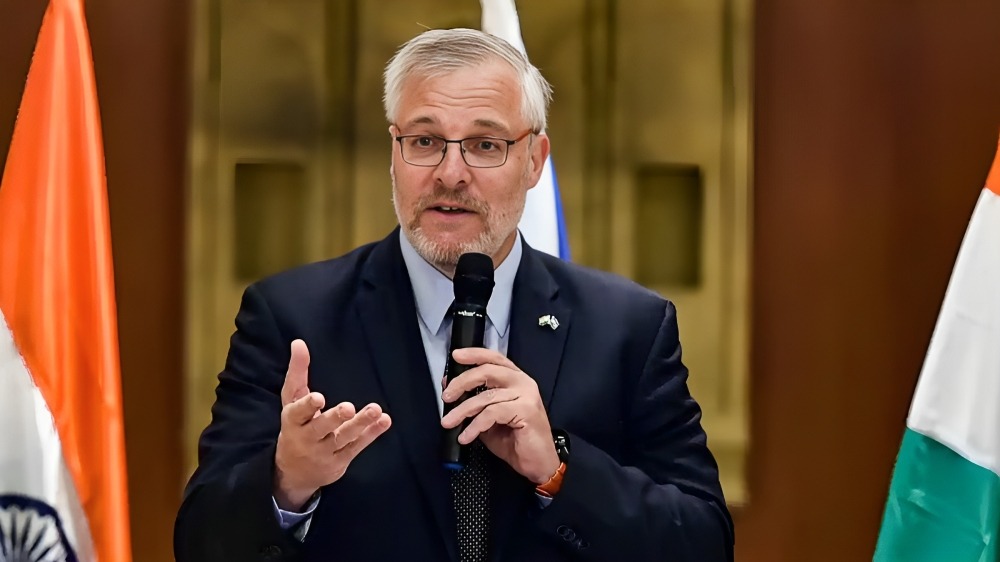NEW DELHI: With the conflict between Hamas and Israel entering its third week, concerns are mounting that heightened tensions in the broader Middle East region could potentially lead to further outbreaks of violence. Lebanon, a country facing severe economic and political challenges, is at risk of getting embroiled in the escalating conflict between Israel and Hamas. Hezbollah. a Shiite militant group, has been preparing for potential involvement in the conflict ever since Hamas launched a surprise attack on October 7, resulting in significant casualties and Israel’s subsequent declaration of war. So far, Hezbollah has conducted multiple strikes on Israeli targets from Lebanese territory, leading to retaliatory actions by the Israel Defense Forces (IDF), marking the most significant escalation since their 2006 war.
In an exclusive interview with The New Indian, Naor Gilon, Ambassador of Israel to India, discussed the potential for the conflict to extend into Lebanon and how it has been inciting Israel. He also noted the unusual situation where Gaza experiences shortages of water and oil but consistently maintains a steady supply of rockets.
Shedding light on concerns about Israel-Hamas war expanding to Lebanon, Gilon said, “The war’s expansion hinges on Hezbollah’s choice to de-escalate; until that happens, there’s no certainty. However, if they decide to become more deeply involved, then it will be a different ballgame.”
In 2005, following Israel’s withdrawal from Gaza, the territory effectively gained a degree of autonomy. However, the political landscape shifted significantly in 2006 when Hamas assumed control of Gaza. This change marked a significant transition in the governance and leadership of the region, ultimately impacting its relationship with Israel and the broader geopolitical dynamics in the Middle East.
Also Read: EXCLUSIVE | Dismantle Hamastan using air power: Ex IDF chief on Gaza invasion
Speaking on the matter, he said, “From 2005, Gaza has operated as an independent state, not connected to the Palestinian Authority in any way. Israel withdrew from Gaza in 2005, evacuating around 10,000 Israeli citizens and dismantling 20 communities. Since then, there has been no Israeli occupation of Gaza.
“However, in 2006, Hamas won elections in Gaza, and in 2007, they forcefully kicked out the Palestinian Authority. So, from 2005, we are not there, we don’t want anything to do with them. In fact, we consider it as an international border where it can regulate the movement of goods.”
On October 11, Israel’s Energy Minister, Israel Katz, confirmed that the country had halted the flow of water, electricity, and fuel into Gaza. He issued a warning that Israel would continue to tighten its blockade until the Hamas threat was eliminated.
Taking to the microblogging site X, Katz wrote, “For years we supplied Gaza with electricity, water and fuel. Instead of saying thank you, they sent thousands of human animals to slaughter, murder, rape and kidnap babies, women and the elderly. That’s why we decided to stop the flow of water, electricity and fuel and now their local power station has collapsed and there is no electricity in Gaza.”
Also Read: EXCLUSIVE | Iran’s shiite foxes leader of this evil axis: Former IDF chief on Israel-Hamas war
Referring to Gazans expressing concern about an “unprecedented crisis,” the Ambassador highlighted that, despite these urgent challenges, it consistently receives a steady stream of rockets, indicating their priorities.
“They cried about how they have a problem of water, how they have a problem of oil. But it’s very strange that they never run out of rocket supply. It clearly shows their priorities, how they prepare themselves, and what is important to them. It is actually very unfortunate,” he stated.











